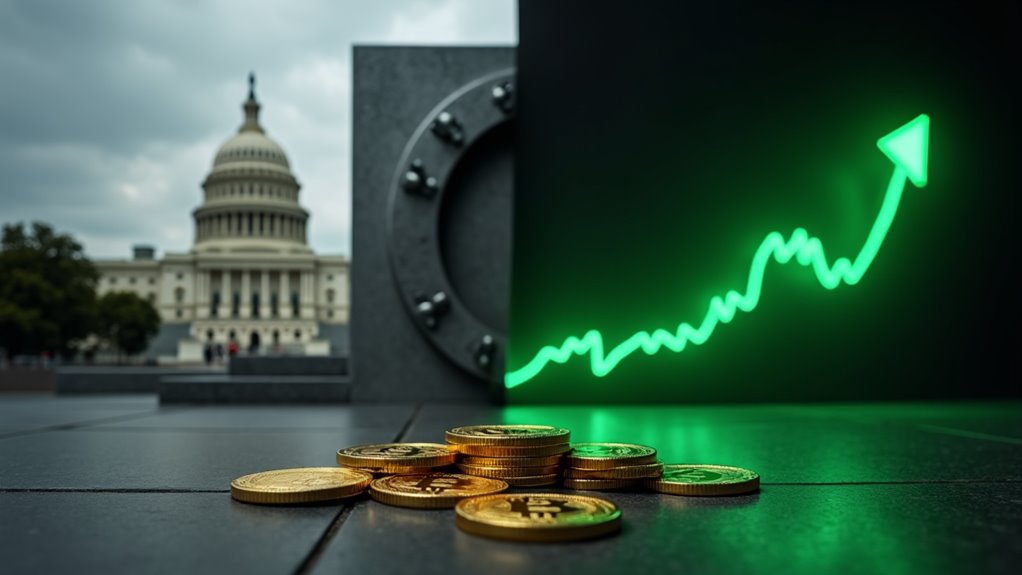Senator Lummis has raised alarms that the Biden administration potentially sold government-owned Bitcoin at low prices, missing out on billions in value appreciation. Government records indicate the US previously held around 200,000 Bitcoin from forfeitures, reportedly selling half its 400,000 BTC holdings for approximately $370 million. Lummis has formally inquired about remaining holdings and introduced legislation proposing a “strategic Bitcoin reserve.” The full financial impact remains a contentious point worth exploring further.

Since taking office in January 2021, the Biden administration has charted a complex and evolving relationship with Bitcoin and the broader cryptocurrency ecosystem. President Biden’s Executive Order on cryptocurrency, signed on March 9, 2022, directed federal agencies to examine both risks and benefits of digital assets while exploring the possibility of a government-issued digital dollar.
The crypto community initially responded positively to this development, with Bitcoin prices surging to $42,000 following the announcement. However, subsequent regulatory actions have painted a more complicated picture. The administration has proposed a 30% excise tax on energy consumed by Bitcoin miners, citing environmental concerns and questioning whether the economic benefits justify the electricity usage. The Executive Order particularly emphasized six key areas including consumer protection, financial stability, and illicit activity prevention. The comprehensive framework seeks to promote responsible innovation while addressing potential risks in the digital asset space.
Meanwhile, Senator Cynthia Lummis has raised eyebrows with claims that the Biden administration may have sold significant portions of the government’s Bitcoin holdings. According to Lummis, the US government once possessed approximately 200,000 Bitcoin from various asset forfeitures. She’s issued formal inquiries to the US Marshals Service about remaining holdings and introduced legislation to establish a “strategic Bitcoin reserve.” These inquiries reflect broader concerns about regulatory clarity across international jurisdictions affecting crypto market stability.
Think of it like selling beachfront property right before a real estate boom—the government reportedly sold roughly half its 400,000 BTC for around $370 million, assets now worth an estimated $17 billion. Ouch!
Talk about a missed opportunity of historic proportions—the ultimate government fire sale that backfired spectacularly.
This approach stands in contrast to the Trump administration’s stance, which focused on promoting innovation through regulatory clarity and encouraged the development of dollar-backed stablecoins while prohibiting a government-issued CBDC.
The Department of Justice under Biden has adopted an expansive interpretation of money transmission laws, charging developers of non-custodial Bitcoin services with money laundering—a move critics say criminalizes core elements of the Bitcoin network and diverges from established definitions.
As regulatory conversations continue and Bitcoin adoption grows globally, the question remains whether the US government’s approach to its Bitcoin holdings represents prudent financial management or a missed multi-billion dollar opportunity.
Frequently Asked Questions
How Much Bitcoin Was Sold by the Biden Administration?
The exact amount of Bitcoin sold specifically during the Biden administration isn’t clearly stated in the provided information.
While the background indicates the U.S. government sold approximately 195,092 BTC between 2014 and 2023 (spanning multiple administrations), the data doesn’t specify how much was sold during Biden’s presidency alone.
Recent Bitcoin movements to new wallets and Coinbase have sparked speculation about potential sales, but official confirmation is lacking.
Could These Sales Have Influenced Bitcoin’s Market Price?
Large-scale government Bitcoin sales could potentially influence market prices. Analysts estimate that selling 200,000 BTC (1.9% of total supply) might impact prices between 2.8-11.2%.
When the government moved $963 million to Coinbase, Bitcoin experienced a 17.4% drop, exceeding these projections. However, market impact appears limited long-term as institutional investors continue accumulating.
The announcement of Trump’s Strategic Bitcoin Reserve and government denials of immediate sales have provided some market stabilization despite short-term volatility.
What Alternatives to Selling Were Proposed?
Several alternatives to selling seized Bitcoin were proposed by cryptocurrency advocates.
These included establishing a strategic Bitcoin reserve similar to gold holdings, holding the assets for longer-term appreciation, creating a sovereign wealth fund, or using them as collateral for government borrowing.
Senator Lummis specifically suggested maintaining a reserve of 1 million BTC over five years, positioning Bitcoin as a strategic store of value while generating potential returns for the government without additional taxpayer burden.
Does Senator Lummis Own Bitcoin Herself?
Yes, Senator Lummis does own Bitcoin.
According to recent disclosures, she purchased Bitcoin worth between $50,001 and $100,000 in August 2024 through the exchange platform River Financial.
This purchase aligns with her public stance on cryptocurrency, as she’s been a long-time Bitcoin advocate.
Lummis filed this disclosure in compliance with congressional ethics rules.
Her personal investment reflects her broader political position that Bitcoin serves as a strategic long-term asset similar to “digital gold.”
How Do Other Countries Manage Seized Cryptocurrency Assets?
Countries manage seized cryptocurrency assets through various approaches. The UK is considered a leading jurisdiction for crypto seizures, while the US Marshals Service held $919 million in cryptocurrency as of December 2021.
Most nations can confiscate crypto using existing asset recovery laws rather than specialized legislation. International cooperation networks like the Egmont Group facilitate cross-border efforts.
Some countries are developing innovative approaches—Russia is considering a governmental fund, while the Marshall Islands recognizes decentralized autonomous organizations as legal entities.









